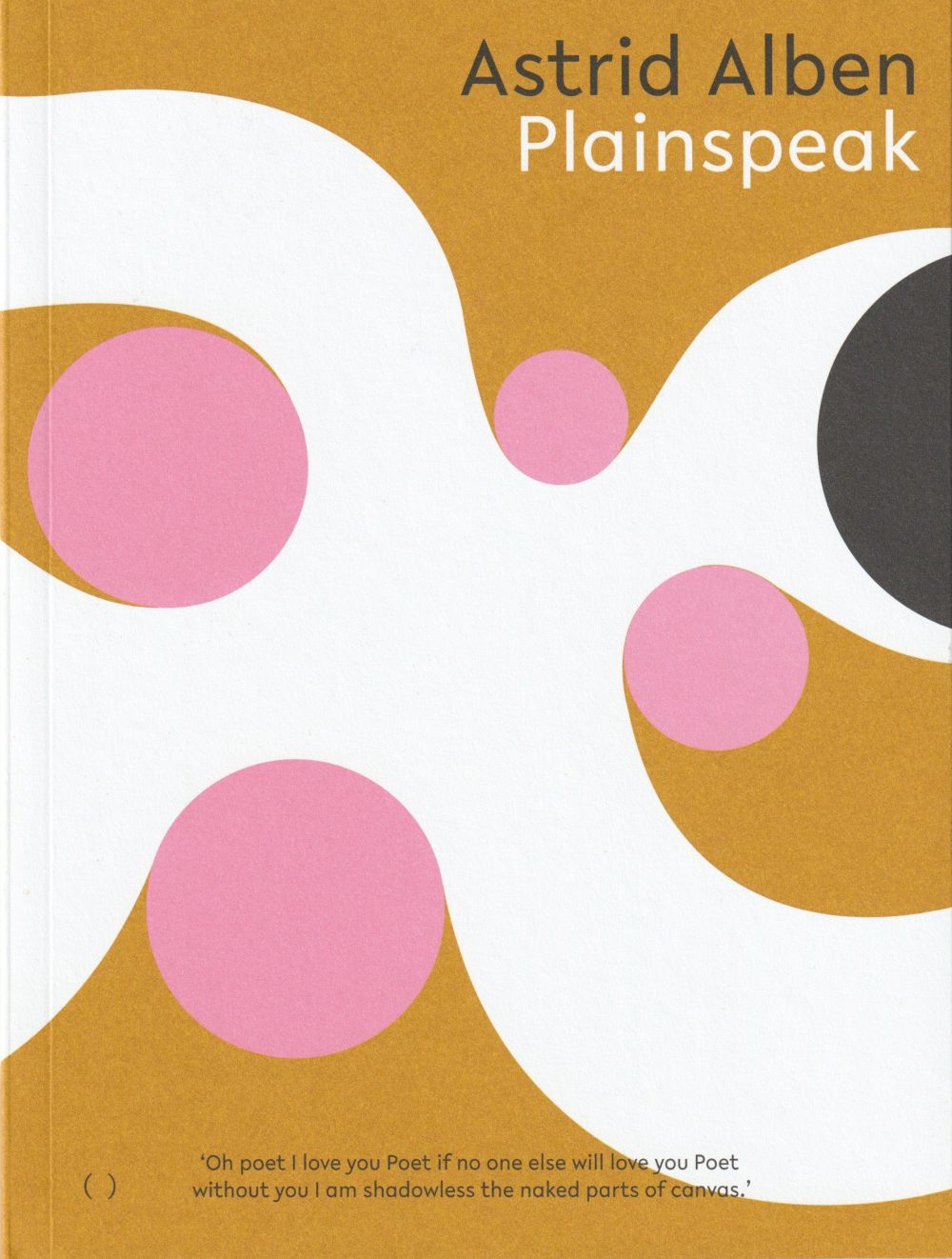Quotation: Astrid Alben

The old sun waltzes through August. Hail!
to be alive the heart steeped waist deep
in the persistent hum of ordinary days for years
I felt I should be somewhere else but not today
today I’m no stranger to trying to be human
in the empty stadium of life.
– Astrid Alben, ‘Hallelujah,’ in Plainspeak
Astrid Alben’s Plainspeak has been out for a while from Prototype, and I had it in my possession for several months before I got around to reading it. I acquired it (along with another of her Prototype collections called Little Dead Rabbit) at the personally-infamous Café Oto Xmas Book Fair, where I managed to blow my end of year present-buying budget on myself and no one else, as well as my food budget for January. But it was worth it! (And I went vegan, which has helped recuperate losses.)
None of this really accounts for why I took so long to read it. And all those months (plus the years in which I knew of the book’s existence, where I could have bought it, but didn’t) seem like quite a loss, given how much joy it brought.
The most striking thing about Astrid Alben’s Plainspeak is the syntax. I am reminded of something Charles Olson said of Robin Blaser (which was, in my estimation, complete nonsense, the kind of garbage bad creative writing mentors spit out discouragingly at students to protect their own fragile, limping egos from the often astonishing work their supposed inferiors produce). Something like, “I’d trust you anywhere with image, but you ain’t got no syntax.”
OK, probably misquoting and hamming up the accent, but my point here is: Blaser’s grasp of idiom was as exquisite as Alben’s deployment of syntactical overlaps. I’d trust her anywhere with syntax, but here, in Plainspeak, she does something wow.
As best as my technical-grammatical limits allow, what I see happening is a kind of doubling of subject-object in clause chains. What I mean is (and without the book to hand I can’t quote beyond what I shared in quotation) something like this:
the cat sat on the mat + the mat is placed by the front door + the front door always stood open
becomes, in Plainspeak, a joyously rushed semi-sense sentence:
the cat sat on the mat by the front door always stood open
I’m not sure I’ve quite got the hang of it in condensing the first two clauses, but hopefully the second part is clearer. The front door simultaneously stands in dual position between the mat and standing-open clauses. Yet the elision also causes a strange, stall, as if by recognising a gap or missing stitch around the front door’s placement, a logical disruption occurs forcing you to take stock, reassess, retread and recognise the overlap and ask: Does the cat always stand open?
Invoking precedents as I read to make sense of Alben’s style, I thought very quickly of Geoffrey Hill’s Speech! Speech! There, he uses the vertical publisher’s mark | (known as virgula, I think, in Hill’s parlance) to indicate a marginally similar break in the syntax. The mark triples meaning in the line, so that you might read two distinct clauses, separated by a fullstop, or two clauses separated by commas, or the flow of the line straight through as a single unit. I.e., something like:
the front door | always stood open
could be
the front door. Always stood open
the front door, always stood open
the front door always stood open
That’s a possibly terrible example, but I’ve put my Hill in unreachable boxes so can’t draw actual ones. But the point I’m trying to make here is that Hill’s use of the mark forces the reading to slow down tremendously. There’s something showy about it, intellectually insistent on its own brilliance, and its desire to retrain how you read.
By contrast, Alben’s syntax is impossibly accessible and – yes, dammit, more poetry needs to be like this! – fun. Plainspeak, as a title, suggests everything you read is very much in an everyday language. I’d say it is, but there’s a kind of difficulty in how it trips you up syntactically, though definitely not with the slow pace of Hill’s deliberations. Surprisingly, the tripping feels as commonplace as the Englishes I hear out and about. Dialects and odd constructions, folded syntax, missing words. This kind of syntactical craft is so very ephemerally-grounded and vernacular.
Coming back to that point I made about the doubling of subjects and objects in the clause builds (the ‘front door’ in my hasty example), I feel there’s an underlying ethical point being made. For a long time, I’ve felt Englishnesses clinging to the tyranny of subject-verb-object clause agreements. It’s how you teach (read: ‘discipline’) foreigners to speak proper like. It’s the backbone of an imperial project to reshape the perception of reality through the British Council’s soft-power colonialist mission. It’s a way of convincing people to adopt your bureaucracy, your systemic oppressions, your literature. It’s a way to teach ‘right’ reading and flood other markets with dead white sharks who exemplify Englishness, while frequently, covertly, or flagrantly and permissively breaking all the rules Empire sets for inferior peripheral subjects.
Maybe this is a bit of a stretch and I’m superimposing / channelling my constant inner monologue on the world (but this is a blog, after all). Alben is a long time resident of London. I met her, I think, about 15 years ago, while I was working in Covent Garden. She was enthusiastic, energetic and had a confidence with language I found admirable, for someone I assumed spoke English as at least a second language. At the time, her first book, Ai! Ai! Pianissimo, was not yet published and she was still working through the first (or was it second) of the Pars Foundation treat(ise)s – on Elasticity? From the work, old and new, I find a kind of stretching of boundaries at work, something I aspire to as well. Plainspeak is undoubtedly more fun than Ai! Ai! Pianissimo, which, perhaps for its publication and editorial through Arc, a relatively serious house, may have led me to miss the energy and humour,
Plainspeak is uproariously pleasurable. I would quote more, as I said, but the reason I can’t find my copy, as I’ve just remembered, I gave it away last summer to a friend. The trouble with these great indie books, you can’t just walk into most bookshops and buy them, which means these artists are less able to make a living off great books, so I find myself waiting for the prompt of another summer/winter sale via email newsletter to get hold of a new copy, if cashflow permits. It’s always a wonder to me how people survive as artists in London, which has become so inhospitable to anyone but billionaires over the last two decades. Yet I’m glad people do, especially when they arrive at this kind of stellar, joyous work.


